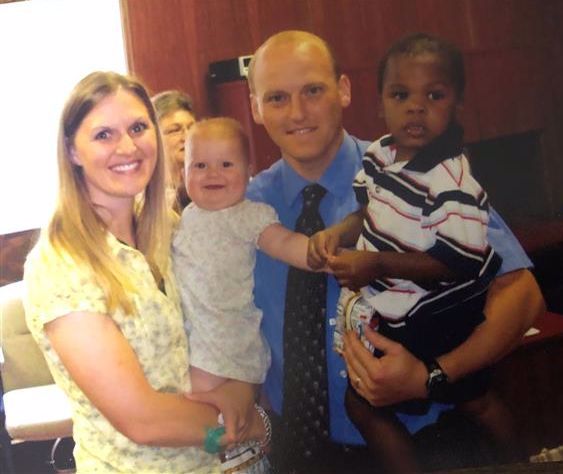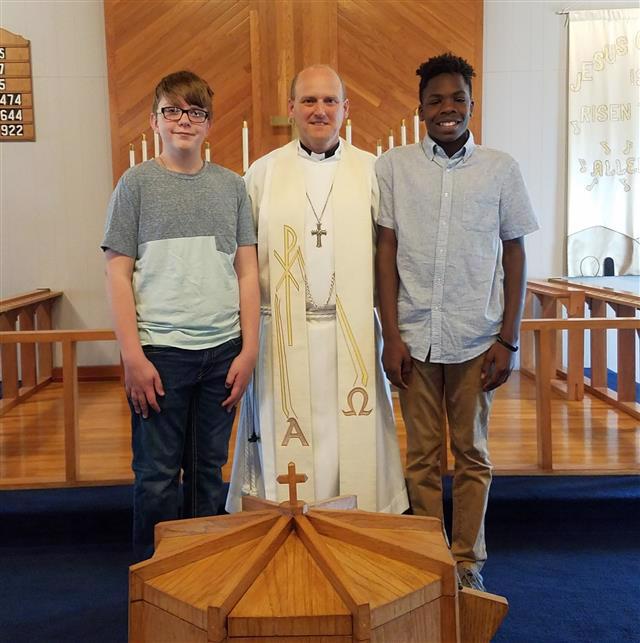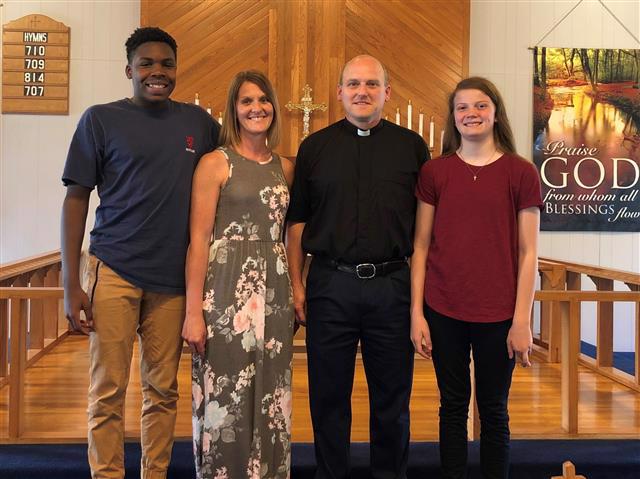Pastoral Letter to the Saints of the Kansas District
Affirming Our Common Humanity
Dear Friends in Christ,
“For [Christ] Himself is our peace, who has made us both one and has broken down in His flesh the dividing wall of hostility” (Eph 2:14).
Would my son be welcomed and embraced in your congregation? I’ll return to this question later.
We met our son, Eli, when he was eight months old. He was the foster child of a member of the congregation where I had done my field work while at the seminary in St. Louis. In God’s divine care, Eli was placed in the home of a Christian woman, the 28th child she had fostered for adoption, and he was baptized on May 21, 2006 at St. John’s Lutheran, St. Louis. Just over two years later, on June 26, 2008, Shelli and I were able to officially adopt him at a St. Louis County courthouse.

Eli has mainly grown up in a white world. He is part of an “unusual” class at Abilene, where he is one of seven black students in his grade. He’s been bullied by classmates because of his skin color. We’ve taught him to keep his hood off his head and his hands out of his pocket. We’ve taught him not to hang out with “the wrong crowd” because he will and has been labeled. Just two weeks ago, he was profiled by security officers in the electronics section of a big box store in Salina. As he was browsing, two officers moved from their post to keep an eye on him; when Eli walked away, the officers followed . . . all the way to the door. You can probably imagine how this made Shelli feel as she watched it happen.
Eli is a baptized child of God, loved and cherished by us, our immediate family, and our congregational family. He has been taught to pray and do nightly devotions with us. He has been catechized in the Christian faith and has confessed the faith into which he was baptized on the day of his confirmation. He attends Sunday School, youth group, and church services, where he receives the body and blood of Christ in the Lord’s Supper regularly and often for the forgiveness of his sins and the strengthening of his faith. He is the only non-white person to ever be confirmed at Faith Lutheran, Abilene.

We’ve done our God-given best to raise him in the Christian faith. Are we perfect parents? Absolutely not. Is he a perfect child? By no means.
My son is 14 years old. We have roughly four years left with him at home before he ventures off into the real world. What will he do? Where will he live? How will he be treated? Will he be safe? God only knows at this point. What I do know though, is that I don’t want him to live in our basement, and I definitely don’t want him to stray from the Christian faith and leave our church body. He’s been taught that there is one baptism for the remission of sins; that in the Lord’s Supper, he’s receiving the true body and blood in the unleavened bread and wine for the forgiveness of his sins and the strengthening of his faith. He desperately needs that—and so do you and I!
So, would my son be welcomed and embraced at your church? What if he wasn’t the district president’s son? What if he was your next-door neighbor? Would you befriend him? Would you offer him an invitation to church? What if he visited your church unannounced? He’s growing. Right now, he wears a size 13 shoe and has some very large hands. If you didn’t know him, he could be intimidating.

I pray that as Eli goes through life, people will take the time to get to know him, keeping in mind the words of Galatians 3:26-27: “For in Christ Jesus you are all sons of God through faith. For as many of you as were baptized into Christ have put on Christ” (Gal 3:26-27).
The Work Ahead
Our nation has a long way to go, which we’ve seen recently with the May 25 death of George Floyd, the widespread protests, and calls for action.
How can we move forward?
First, let’s begin with prayer. “Come, holy Fire, comfort true, Grant us the will Your work to do, And in Your service to abide; Let trials turn us not aside. Lord, by Your pow’r prepare each heart, And to our weakness strength impart, That bravely here we may contend, Through life and death to You, our Lord, ascend. Alleluia, alleluia!”
(Come, Holy Ghost, God and Lord – LSB 497, St. 3)
Second, let’s educate ourselves. A good start would be reviewing and taking to heart 2019 Synod Convention Resolution 11-04A: “To Affirm the Common Humanity of All People and Ethnicities” (
2019
Convention Proceedings, pp. 216-218). Among the resolves of that resolution:
Resolved, That Synod in convention publicly condemn the sin of racism in all its manifestations …
Resolved, That the members of Synod be encouraged to utilize the 1994 CTCR document Racism and the Church that was commended to the Synod by the 1995 convention (Res. 2-05A,
Proceedings, 112) …
Resolved, That the members of the congregations of the Synod be encouraged to work toward racial reconciliation and equality within the Church and within society-at-large …
Resolved, That as followers of Christ, “we regard no one according to the flesh” (2 Cor. 5:16), that we serve the One who has entrusted “to us the message of reconciliation” (2 Cor. 5:19), and that we celebrate that “in Christ God was reconciling the world to himself” (2 Cor. 5:19).
The Lutheran Church—Missouri Synod has spoken against racism for many years and has assembled a collection of resources on racism on its website. I also recommend a couple of resources from Rev. Keith Haney, missions executive for the LCMS Iowa West District, including a blog post, “Racial Healing Begins with Recognizing Our Neighbor” and a six-part Bible study, “One Nation under God: Healing Racial Divides in America.”
Third, we need to pass on these lessons in our homes. If you’re a parent, grandparent, guardian, or other support figure, you have tremendous influence over those in your care. What can you do at home to help advance the goals of Resolution 11-04A? If it doesn’t start there, we’re not likely to make much progress.
Fourth, let’s repent of our own sin when we have succumbed to racism. We’re coming out of a difficult time with the pandemic. Emotions are high. Let the Word of God prevail, and don’t give in to the tempter. If your congregation is interested in the reconciliation process, I commend to your study the Ambassadors of Reconciliation Bible study called, “Go and Be Reconciled: What Does This Mean?”
Fifth, receive the healing salve of Jesus’ blood shed for you on the cross which grants us pardon, forgiveness, and remission of all our sin.
Finally, as you and your congregation consider how you can work toward racial reconciliation and understanding in your context, remember these words about grace, which we’ve offered before during the pandemic: “We live in grace, we receive grace, and we give grace to others. This is a time to be especially mindful of giving others—and yourself—grace.”
Dear friends, now more than ever, the world needs the peace that only Jesus can give. You and I have received that peace of the forgiveness of our sins through our baptism. We have a great heritage in the Holy Scripture and the Lutheran Confessions to “proclaim, teach, and share” with others. Pray for the Spirit to break down hostile barriers. Pray for the Spirit to give you “new eyes” to see your neighbor in love (and willing ears to
listen to those neighbors). Pray for the Spirit to give you opportunity to extend an invitation to someone you know to church with you, where they can hear the life-saving message of Christ.
God be with you and your congregations as we live lives where Jesus is seen through us!
In the service of Christ,
President Panzer

Please feel free to share this message with others who might not be on our subscriber list (e.g., congregation members). | 